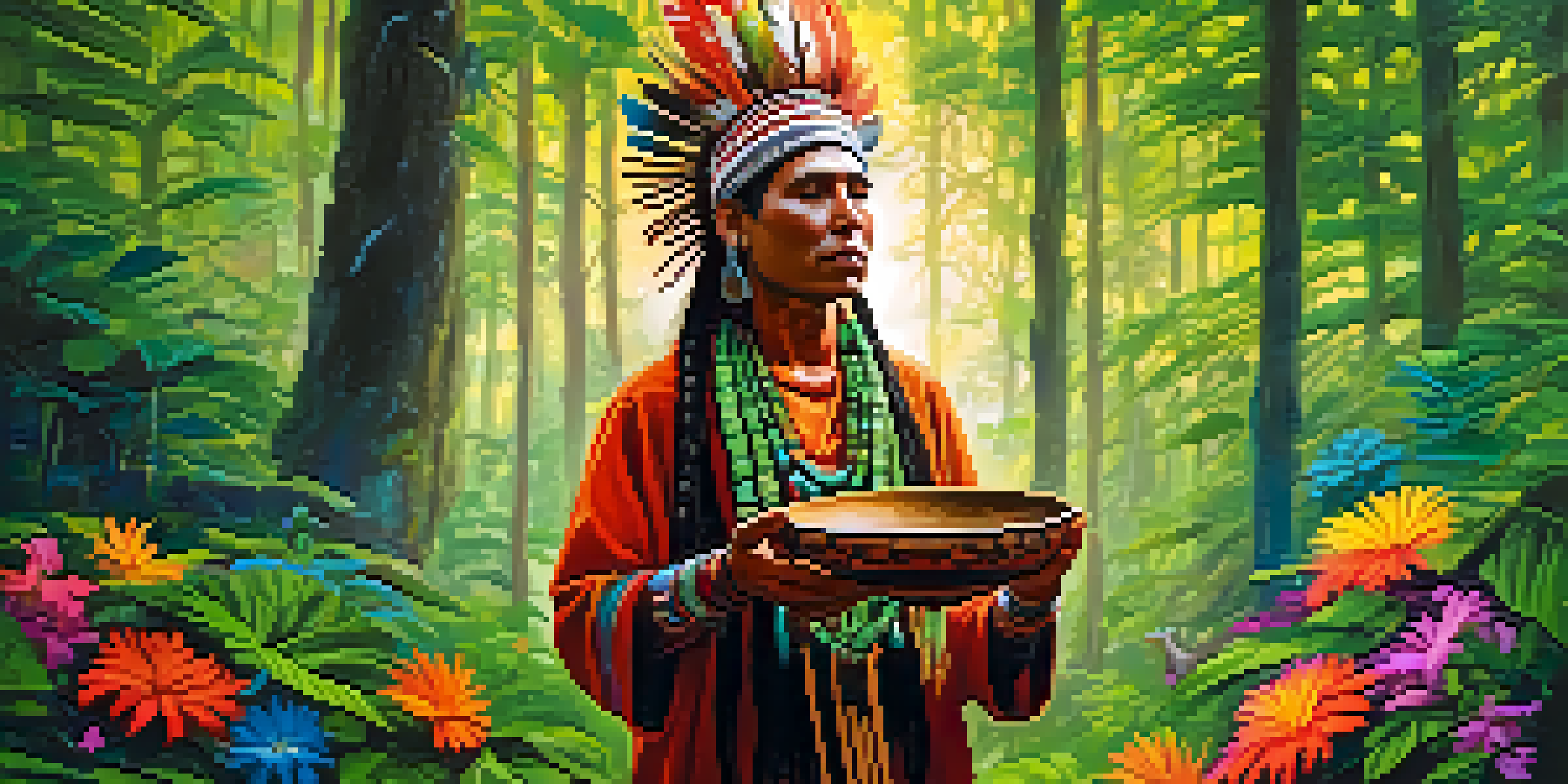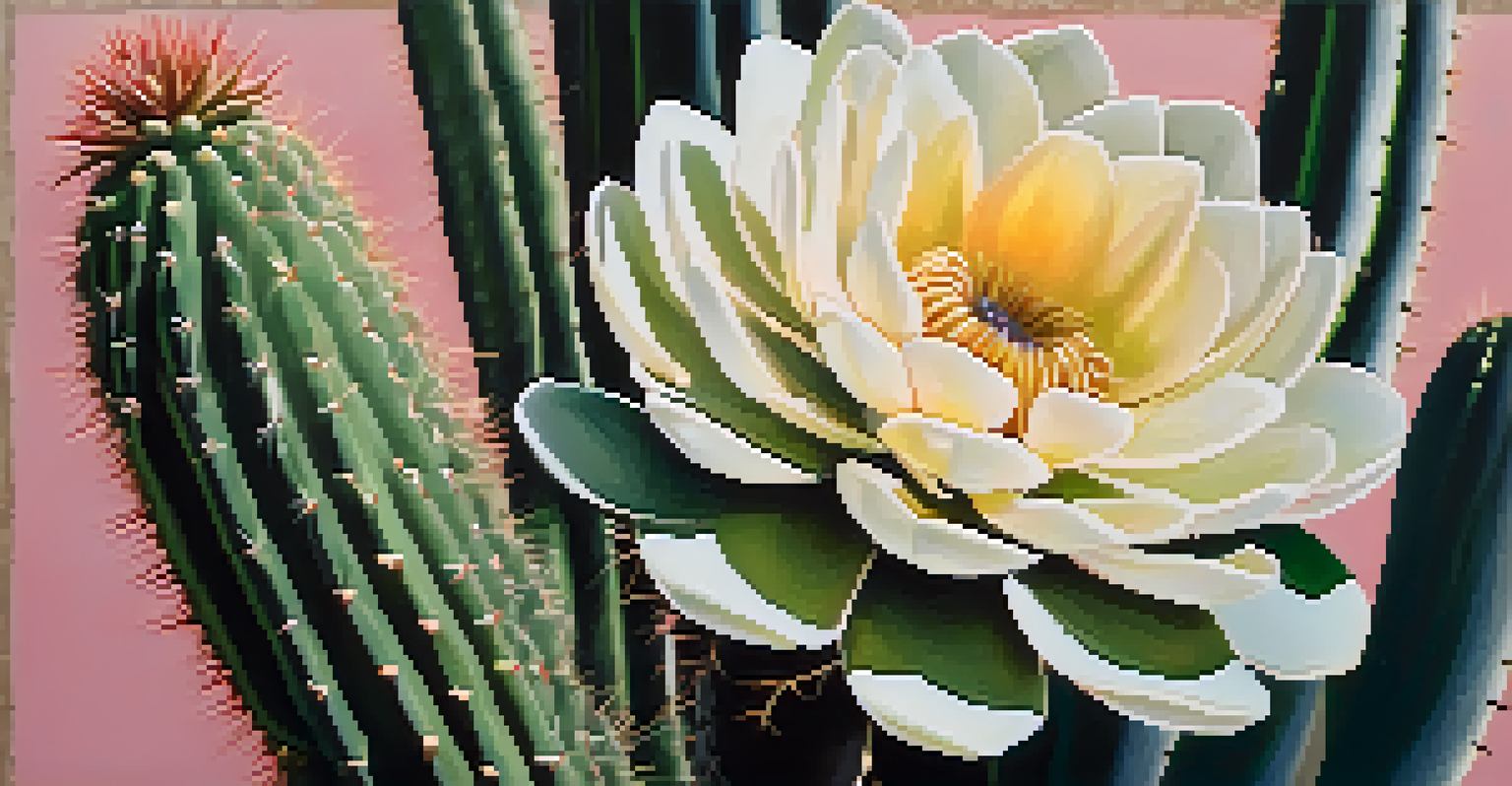The Role of Entheogens in Indigenous Cultures and Rights

Understanding Entheogens and Their Cultural Significance
Entheogens are substances, often derived from plants, that have been used in spiritual and religious practices for centuries. They are known for inducing altered states of consciousness, which many indigenous cultures believe facilitate a deeper connection with the spiritual world. For these communities, the use of entheogens is not merely recreational; it’s a sacred ritual that fosters community bonding and personal insight.
The greatest discovery of my generation is that a human being can alter his life by altering his attitude of mind.
The term 'entheogen' itself comes from ancient Greek, meaning 'generating the divine within', highlighting their spiritual importance. Various cultures, from the Amazonian tribes using ayahuasca to Native American groups with peyote, have integrated these substances into their ceremonial practices. This deep-rooted connection emphasizes the need for respect and understanding when discussing their use.
As we delve deeper into the role of entheogens, it becomes clear that they are more than just substances; they are part of a broader cultural narrative. They serve as tools for healing, guidance, and transformation, influencing not only individual lives but entire communities. This rich tapestry of cultural significance is vital for appreciating the role of entheogens in indigenous practices.
Historical Context of Entheogen Use in Indigenous Cultures
The use of entheogens dates back thousands of years, with archaeological evidence suggesting their presence in various ancient civilizations. From the Mayans to the indigenous tribes of North America, these substances have been integral to rituals, healing, and social cohesion. Understanding this historical context enriches our appreciation for their contemporary significance.

In many cases, entheogenic practices were intertwined with the natural environment, reflecting a deep respect for nature and its resources. This connection illustrates a holistic worldview where human beings are part of a larger ecosystem, not separate from it. Such perspectives often challenge modern views that prioritize industrial progress over ecological balance.
Entheogens and Cultural Significance
Entheogens are sacred substances used in indigenous cultures to foster spiritual connections and community bonding.
However, colonization and globalization have disrupted these traditional practices, leading to a loss of knowledge and cultural heritage. This historical backdrop highlights the resilience of indigenous cultures and their ongoing efforts to reclaim their rights and practices. It also underscores the importance of preserving these traditions in the face of modern challenges.
Legal Status and Rights of Indigenous Peoples
The legal status of entheogens varies widely around the world, often reflecting broader attitudes towards indigenous rights. In many countries, indigenous groups have fought for the right to use these substances in their traditional practices, facing legal hurdles that threaten their cultural integrity. Understanding the intersection of entheogen use and legal rights is critical in advocating for these communities.
We do not inherit the earth from our ancestors, we borrow it from our children.
International frameworks, such as the United Nations Declaration on the Rights of Indigenous Peoples (UNDRIP), aim to protect the rights of these communities, including their cultural practices. Yet, the implementation of such frameworks can be inconsistent, leading to ongoing struggles for recognition and respect. This legal landscape is often complicated by differing national policies and cultural perceptions surrounding entheogens.
As discussions around drug policy reform gain traction globally, there is hope for more inclusive approaches that respect indigenous practices. Advocating for the legal recognition of entheogenic use can empower these communities, allowing them to reclaim their heritage while fostering cultural resilience. This legal acknowledgment is a vital step in addressing historical injustices.
Entheogens as Tools for Healing and Spiritual Growth
For many indigenous cultures, entheogens are seen as powerful tools for healing and personal transformation. They are often used in shamanic rituals to facilitate deep introspection and emotional release, allowing individuals to confront personal and communal traumas. This aspect of healing is especially relevant in today's context, where mental health is increasingly recognized as a critical component of overall well-being.
The therapeutic potential of entheogens has garnered interest from modern psychology and medicine, prompting a resurgence in research. Studies have shown promising results in treating conditions like PTSD, depression, and anxiety, suggesting that these substances may hold keys to healing that traditional therapies sometimes overlook. This convergence of ancient wisdom and modern science can pave the way for innovative approaches to mental health.
Historical Context and Resilience
The historical use of entheogens highlights indigenous cultures' resilience amid challenges posed by colonization and globalization.
However, the use of entheogens for healing must be approached with caution and respect, ensuring that indigenous knowledge and practices are honored. It’s essential to engage with these traditions ethically, recognizing the cultural context from which they arise. By doing so, we can foster meaningful dialogue that respects both the past and the future of entheogenic practices.
Cultural Appropriation vs. Cultural Appreciation
The increasing popularity of entheogens in mainstream culture raises important questions about cultural appropriation versus appreciation. Many individuals seek to incorporate these practices into their lives without understanding their cultural significance, risking the commodification of sacred traditions. This distinction is crucial as we navigate the relationship between indigenous cultures and a broader audience.
Cultural appropriation involves taking elements from a culture without understanding or respecting their original context, often leading to misrepresentation. On the other hand, cultural appreciation involves a genuine interest in and respect for another culture, fostering mutual understanding. It's essential for individuals interested in entheogens to approach these practices with humility and a desire to learn from indigenous perspectives.
Engaging with indigenous communities and supporting their rights can be a positive step towards cultural appreciation. By honoring their traditions and seeking to understand their practices, individuals can foster a more respectful dialogue. This approach can enrich the experience for everyone involved, promoting a deeper connection to the cultural roots of entheogenic use.
The Future of Entheogens in Indigenous Rights Movements
As awareness of the benefits and cultural significance of entheogens grows, they are increasingly becoming a focal point in indigenous rights movements. Activists advocate for the protection of these practices, arguing that they are essential for cultural survival and identity. This shift in perspective can empower indigenous communities, giving them a platform to share their knowledge and experiences.
The future of entheogens in these movements may also intersect with broader societal changes regarding drug policy. As more people recognize the potential benefits of entheogens, there may be greater support for legal reforms that honor indigenous rights. This evolving landscape presents an opportunity for collaboration between indigenous communities and allies who seek to promote social justice.
Legal Rights and Cultural Respect
Advocating for the legal recognition of entheogens is crucial for protecting indigenous practices and cultural integrity.
However, the path forward is not without challenges. Resistance from governmental and societal institutions can hinder progress, making it essential for advocates to remain persistent and informed. By working together to elevate indigenous voices and protect their practices, we can contribute to a more equitable future that honors the rich tapestry of entheogenic traditions.
Conclusion: Recognizing the Value of Indigenous Knowledge
In conclusion, the role of entheogens in indigenous cultures is profound and multifaceted, encompassing healing, spirituality, and community bonds. Recognizing the value of these practices not only honors indigenous traditions but also enriches our understanding of human experience. As we navigate the complexities surrounding entheogens, it’s essential to approach these subjects with respect and an open heart.
The conversation surrounding entheogens invites us to reflect on our relationship with nature, spirituality, and each other. By acknowledging the wisdom of indigenous cultures and their connection to entheogens, we can cultivate a deeper appreciation for the diverse ways in which humans seek meaning and healing. This awareness fosters a more compassionate and inclusive society.

Ultimately, advocating for the rights of indigenous peoples and their entheogenic practices is a step toward reconciliation and healing. By amplifying their voices and respecting their traditions, we contribute to a collective journey that honors the past while paving the way for future generations. Let’s continue to engage with these rich cultural narratives, ensuring they are preserved and celebrated for years to come.